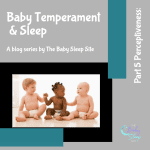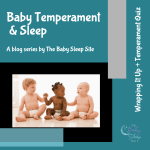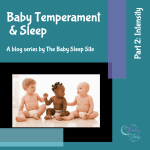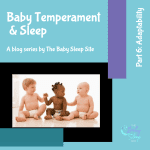
Welcome to Part 4 of my Baby Temperament and Sleep Series. If you are just joining us, you may want to start with Part 1, where I define baby temperament. In part 2, I discussed baby temperament trait, intensity. In part 3, I reviewed persistence. This article will review sensitivity. At the end of the series, I will give you a quiz to determine your child’s temperament.
Baby Temperament – Sensitivity
Your baby’s sensitivity is how aware your child is to noises and emotions, and also, how aware she is to temperature, taste, and texture. Your child’s sensitivity (or lack of) can come out in a variety of places. For example, some kids might meltdown if their sock is a little crooked on their toes. Another child might complain about loud noise or light being too bright. Your child might also pick up on your stress or emotions, depending on her sensitivity level. You might notice she starts acting “off” if you are under an undue amount of stress.
My first son is fairly sensitive, but probably only moderately so. Even in the womb, he used to wake up and kick when my husband and I went to the movies. After he was born, he’d become over-stimulated in loud gatherings. He’d melt down even when he was just 2 months old. It shouldn’t have surprised me then, 2 1/2 years later, when we went to the Diego Live! show that he told me it was “loud.”
Baby Sleep and Sensitivity
How might your baby’s sensitivity affect his sleep? If your child is sensitive, this means that most likely he will not be the baby or toddler that falls asleep in a room full of people or with a lot of noise. Due to my son’s sensitivity, I even had to remove the nightlight from his room. He’d wake up, see the light, and decide to play in the middle of the night. (They are too young to be scared of the dark when they are a baby.) Once he was older, I bought him a nightlight. It was still a bit too bright, but he LOVED it! I have always had to make sure I put away the dogs, so they didn’t bark during naps. I would work to always keep the noise down, in general.
It is important to watch your baby or toddler’s reaction to things, even at a young age. You might start to notice a connection between your daily activities and her emotions. You will want to take her sensitivity into consideration when you set up where she sleeps, what she wears to bed, and how much noise is going on in the house. Some babies will not like to be too hot or cold while others won’t complain either way. As a baby, we couldn’t have a jacket on my son in the car seat. He’d inevitably cry in the backseat within 10-15 minutes during every car trip. Being first-time parents, we were especially clueless, but we did figure out that he just would get hot and be uncomfortable.
Sleep training your sensitive child might be more difficult. You might question whether he’s comfortable, what’s wrong and why no two days are the same. He might become overstimulated easier and need to nap more often. But, your sensitive child’s sleep is ever more important. Sensitive children “take in” a lot around them and that can be exhausting! But, it’s also difficult for him to settle down for the night and therefore, his bedtime routine might need to be longer than normal.
There is a wide spectrum in sensitivity levels. Once you know your baby’s temperament, you can take into consideration when you choose how to help her get more sleep. You may or may not want to use cry it out to help your baby sleep, but once you know your baby’s personality, that can help you come up with a plan that is more likely to succeed. For help in finding patterns and schedules in your baby’s day, you might want to keep track. You may be interested in using an online baby tracking tool.
For more ideas on how to guide your child in coping with her sensitivity, I recommend Raising Your Spirited Child. She also discusses how to distinguish sensitivity from Sensory Processing Disorder, where your child is so sensitive that it’s debilitating.
Explore each of the 9 temperament traits, Intensity, Persistence, Sensitivity, Perceptiveness, Adaptability, Regularity, Energy, First Reaction, and Mood, focusing on how they play a role in your baby’s sleep and in the final part, take an assessment quiz to help figure out you and your baby or toddler’s temperament and see how it might be similar or different.
Get Sleep Help Personalized For Your Baby’s Temperament!
Your baby’s temperament influences his or her sleep habits in a big way – and that means that the sleep coaching you do with your baby will need to be suited to your baby’s unique temperament. That can be tricky. But not to worry! Our consultants at The Baby Sleep Site® are experienced in creating Personalized Sleep Plans® that are customized to your baby or toddler’s temperament. Even better, once you have your Personalized Sleep Plan®, your consultant will walk you through each step of implementing it at home.
Browse our sleep support consultation options here.








